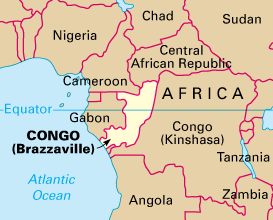At the Itsali primary school, on a dusty road near Brazzaville’s airport, all but one of the 20 teachers are women, a sign of the major gender shift in the Republic of Congo’s educational system over the past two decades.
The small school employs almost exclusively women, from its directors and teachers to administrators and secretaries.
“It is rare to ever find even five male members of teaching staff here,” said Rachel Mfina, who has been working at Itsali since the school was founded in 2003.
At Itsali, conditions are basic. Since there is not enough space to hold separate classes at the same time, lessons take place in five-hour-long “shifts” — one from early in the morning and another from 12:30 pm — while the school yard serves as a shortcut for locals.
But the teachers are enthusiastic. For 25-year-old Gloire Louzolo, who joined Itsala at the beginning of the 2012-2013 academic year, teaching has always been her vocation.
“I’ve loved the profession of teaching since I was little because I liked when my nursery teacher was giving lessons,” she told AFP, her blue blouse covered in chalk dust.
“I was 15 when I entered the national school for teachers (ENI) where I studied for two years. Just after that I started working,” said Louzolo.
It was just over 20 years ago that the image of the teaching profession in Congo started to change.
“The phenomenon of women in our education system began in 1990,” Vital Eka, general director of basic education, told AFP, pointing to the string of structural reforms that were implemented when the central African country fell into recession.
“All of a sudden, teaching was the only profession that still recruited… Women showed more interest. It’s totally natural because a woman is the one who raises (children) in society,” said Eka.
Men, who used to dominate the sector, now prefer to get into fields with better pay such as tax and customs services, he added.
About one third of Congo’s 9,500 teachers work in primary schools, with the rise of female teachers now apparent throughout the country in both state and private institutions.
“Women seem to be priority over men for teaching jobs — and there are more posts for them,” said 49-year-old Aime Godefroy Dianzinga, the parent of an Itsali student.
According to official statistics, the capital Brazzaville tops the league with a record of 1,254 women among its 1,487 teachers.
Coincidence or not, Congo boasts a high level of literacy, which stood at 87 percent in 2011 for a population of 3.6 million.
Christophe Poaty, a spokesman for the CRPE teaching union, says women have come to the fore in the world of teaching “because the training is shorter and their salary arrives more quickly”.
As for the salaries in Congo — an impoverished nation with significant oil resources wracked by two civil wars — teachers can expect to earn a lowly 80,000 to 100,000 FCFA (130 to 152 euros) a month.

